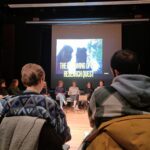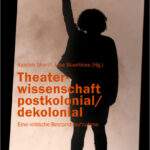
Reflections on panel discussion at the University of Amsterdam
Towards a Post/Decolonial Theatre Studies? About life-long learning processes and rethinking the way we act“ By Sarnia van Capelleveen, Hidde Stobbe, Tai-Jung Yu
Neue Kritische Theaterwissenschaft
Intersektionalität
Aktivismus
Antirassismus
Netzwerk für intersektionale Themen, dekoloniale Methoden und postkoloniale Theorie in der deutschsprachigen Theaterwissenschaft
Über das Netzwerk
Wir, die Neue Kritische Theaterwissenschaft, sind eine Gruppe von Forscher*innen, die fachlich in der deutschsprachigen Theaterwissenschaft angesiedelt sind. Wir haben dieses Netzwerk gegründet, um auf die klaffende Lücke in der deutschsprachigen Theaterwissenschaft bezüglich postkolonialer, dekolonialer und intersektionaler Methodologien, Theorien und Forschungsansätze aufmerksam zu machen. Diese Lücke manifestiert sich auch in der Ignoranz des Fachgebietes, sich mit den rassifizierenden und andauernden kolonialen Praktiken zu konfrontieren, die so häufig noch Theaterpraxen und akademische Diskurse im deutschsprachigen Raum beeinflussen. Auch manifestiert sich darin die anhaltende Exklusion von rassifizierten und minorisierten Theatermacher*innen und Performer*innen sowie ihrer ästhetischen Praxis.
Wir haben dieses Netzwerk als Möglichkeit der Intervention gegründet. Die Neue Kritische Theaterwissenschaft bietet eine Plattform für Theaterwissenschaftler*innen, die zu und mit postkolonialen, dekolonialen und intersektionalen Theorien und Ansätzen arbeiten, um sich auszutauschen, kollektiv zu publizieren und längerfristige Strukturen in der deutschsprachigen Theaterwissenschaft aufzubauen. Das Netzwerk bietet außerdem Werkzeuge und Tutorials für eine nächste Generation von Studierenden, die an intersektionalen, postkolonialen und dekolonialen Themen in der Theaterwissenschaft interessiert sind. Wir haben aus unseren eigenen Lehrerfahrungen heraus festgestellt, dass die Nachfrage nach diesen Themen von Seiten der Studierenden groß, aber das Angebot an den Theaterwissenschaftsinstituten dazu jedoch noch immer eher klein ist. Das wollen wir strukturell ändern. Auch sind wir uns der gewaltvollen und rassistischen Strukturen der weißen Universitäten bewusst, so dass wir insbesondere darauf zielen, BIPOC Studierende der Theaterwissenschaft zu unterstützen, und sie dazu ermutigen, mit uns in Kontakt zu treten.
Im Zuge der weltweiten Black Lives Matter Demonstrationen und lokaler anti-rassistischer Lobbyarbeit Schwarzer Aktivist*innen zur Aufarbeitung der deutschen Kolonialgeschichte und der anhaltenden Kolonialität in deutschen Institutionen haben sich die deutschen Stadttheater in den letzten Jahren verstärkt mit ihren eigenen Blickregimen, Repräsentationsmechanismen und Fragen zu anti-rassistischen Praktiken auseinandergesetzt. Eine ähnliche Bewegung lässt sich leider für die deutschsprachige Theaterwissenschaft nicht feststellen. Forschungsansätze und Curricula scheinen weitestgehend unangetastet von den aktuellen Diskussionen um race und Repräsentation zu bleiben. Wir sind der Überzeugung, dass die Forderung nach der Dekolonisierung der Universität untrennbar mit der Verteidigung der Rolle der Universität als Raum für gesellschaftliches Engagement und sozialpolitische Entwicklungen verbunden ist. Wir verstehen unsere Arbeit als Forscher*innen deshalb ganzheitlich – innerhalb und außerhalb des akademischen Alltags, innerhalb und außerhalb kultureller Räume, innerhalb und außerhalb des Seminarraumes. Unser Ethos ist anti-rassistisch und intersektional.
Wir sind überzeugt davon, dass intersektionale Ansätze und der Gebrauch dekolonialer Methodologien und anti-rassistischer Praktiken in der Theaterwissenschaft nicht als eigene Unterdisziplin zum Tragen kommen sollten, sondern in die Breite theaterwissenschaftlicher Forschungsansätze und -praktiken einfließen müssen. Unser Ziel ist daher die langfristige Entwicklung von postkolonialen, dekolonialen und intersektionalen Methodologien für alle Bereiche der Theaterwissenschaft, sei es die Theatergeschichte, die Aufführungsanalyse oder selbst die Theatersemiotik. Dass wir uns dabei hauptsächlich auf die deutschsprachige Theaterwissenschaft fokussieren, schließt andere regionale theaterwissenschaftliche Diskurse nicht aus. Im Gegenteil, ähnliche Lücken können auch in der Theaterwissenschaft in z.B. den Niederlanden, Belgien und Dänemark festgestellt werden. Unser Fokus ist weniger ein geographischer und nationalstaatlicher als ein epistemologischer.
news

Towards a Post/Decolonial Theatre Studies? About life-long learning processes and rethinking the way we act“ By Sarnia van Capelleveen, Hidde Stobbe, Tai-Jung Yu

Hiermit möchten wir Euch herzlich zum Online Panel Theaterwissenschaft postkolonial/ dekolonial am 11. Januar 2023 um 19 Uhr CET einladen.

Anika Marschall und Ann-Christine Simke’s Artikel „Forensic Architecture in the Theatre and the Gallery: A Reflection on Counterhegemonic Potentials and Pitfalls of Art Institutions“

Der Sammelband “Theaterwissenschaft postkolonial/dekolonial“ herausgegeben von Azadeh Sharifi und Lisa Skwirblies ist diese Woche bei transcript erschienen und jetzt auch als Open Access Version herunterladbar.
Über das Team
Anika Marschall (she/her) currently holds a PostDoc position in the Theatre Studies department at the University of Aarhus. She is the co-editor of the Scottish Journal of Performance and her monography Performing Human Rights: Artistic Intervention into European Asylum will be published with Routledge next year.
“Who is my research benefitting and who is it harming today?”, is my daily question tool to evaluate and hold myself, my actions and work accountable. I am a white, cis-female, able-bodied, thirty-year-old, atheist, German, currently working in a fixed-term contract as Postdoc at Aarhus University Denmark among all white, cis, able-bodied Danish colleagues. In this particular situatedness, I owe my continuous self-education and decentering work to BIPOC artists, scholars and activists in the Nordic countries: Aaiún Nin, Awa Kontaé, Bertrand Besigye, Choco Guilène, Deise Faria Nunes, Dina El Kaisy Friemuth, Jasmine Kelekay, Jeanette Ehlers, La Vaughn Belle, Lesley-Ann Brown, Marronage, Mica Oh, Monia Sander Haj-Mohammed, Phyllis Akinyi, Pia Arke, Temi Odumosu, The Union and Yancé-Myah Antonio Harrison, among many others.
Ann-Christine Simke (she/her) is a PostDoc researcher at the Institute for Theatre Studies at the University of Bern, where she teaches and publishes on institutional dramaturgy, critical race studies and performance studies in a global perspective.
I grew up in a small town in the northwest of Germany and was the first one in my family to attend university. While this lack in academic background required some adjustments and sometimes created a feeling of alienation, I am conscious of how I as a white, middle-class, female, cis-gender, able-bodied German researcher am privileged in a system that systemically marginalizes racialized researchers. I have the (questionable) privilege of being able to move between my home in Glasgow and my fixed-term postdoc position in Switzerland, while acknowledging the neoliberal pressures on early career researchers to stay flexible and mobile across borders and the limitations that this requirement often puts on racialized academics or researchers with the “wrong” passport.
Azadeh Sharifi (she/her) currently holds a position as Visiting Assistant Professor (DAAD-Gastprofessur) at the Department of Germanic Languages and Literatures of the University of Toronto. Prior to that she has been Visiting Professor at the University of the Arts in Berlin (UdK).
I am a former refugee who grew up in Germany without citizenship (and therefore without citizen rights) until her eighteenth birthday. I have been racialized, shamed, policed and marginalized by white Germans for as long as I can remember. One of the most traumatizing experiences within academia was when a white, female German theatre scholar attacked me after a conference on race and migration by asking for my passport. She then told me to shut my mouth when it comes to experiences of migration because I have a German passport. I have since then drowned in my dreams in the Mediterranean Sea just to make her validate my lived experience. This is how I feel when I enter academic spaces because I am never safe. My sense of security and my sense of belonging might change since I have moved to Canada. Within German Theatre and Performance Studies, I am currently the only non-white theatre and performance scholar who could reach beyond a PhD. The answer of German society to the lack of scholars of Color is that it is a social issue. The perception is that migrants and refugees, or their descendants, are from lower working classes, therefore, they are as a group (and individual) not able to reach higher education. Germany has never been good at concealing its race and class matters and gatekeeping within the education system begins for marginalized and racialized subjects at a very early age.
Lisa Skwirblies (she/her) currently holds a position as Visiting Assistant Professor at the Theatre Studies Department of the University of Amsterdam as well as a PostDoc position at the Ludwig-Maximilians-University of Munich.
I was born in the countryside of northern Germany, close to the sea, and my ancestors have all been diasporic white German settlers along the shores of the Baltic Sea (Lithuania, Kaliningrad, Denmark) with different degrees of attachment to Germany as an imagined community. This background and the family narratives around this diasporic experience complicated my understanding of national identity, cultural heritage, and belonging early on and informed my deep interest in German history and in its intricate and intimate entanglements with the histories of colonialism, racism, and antisemitism. The ways in which I understand my work as an historian have been strongly shaped by the multiple research trips to Namibia, that I conducted over the past years, were I had the honor to meet the late Herero historian Alexander Kaputu.
Ressourcen und Werkzeuge
How to make meetings awesome for everyone? (resource sheet)
About decolonising theatre practice (resource sheet)